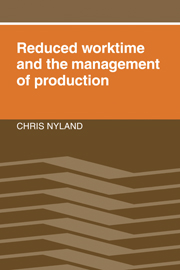Conclusion
Published online by Cambridge University Press: 25 March 2010
Summary
Capitalist industrialised nations are characterised by a tendency to reduce the length of time employees normally spend at their place of employment. Over the last century standard paid worktimes have contracted by approximately 40 per cent. This temporal contraction has had very little influence on the level of employment or on labour costs. The primary objective of this volume has been to explain why the contraction occurred and why it had so little impact in these important areas. It has been argued that the crucial factor propelling the continuing curtailment of worktime has been the tendency for the demands of the production process to periodically come into conflict with the innate and social needs of human beings. This development, which is brought about by the competitive nature of capitalist economies, creates inefficiencies which reductions in schedules can help to alleviate both by allowing the worker greater time to recuperate and by increasing the need for employers to ensure that they utilise their resources with greater efficiency.
Changes in the level of the demands placed upon the worker, it has been argued, may emanate from both the paid workplace and the domestic sector. The demands of each of these arenas acts as a tax on the amount of effort the individual has available to utilise in the other. Thus, workers may find that their ability to cope with a given balance of work intensity and length of worktime is severely undermined if the effort they are able to put into this schedule is reduced by, for example, their spouses taking on paid employment and consequently requiring greater assistance within the home.
- Type
- Chapter
- Information
- Reduced Worktime and the Management of Production , pp. 194 - 203Publisher: Cambridge University PressPrint publication year: 1989



